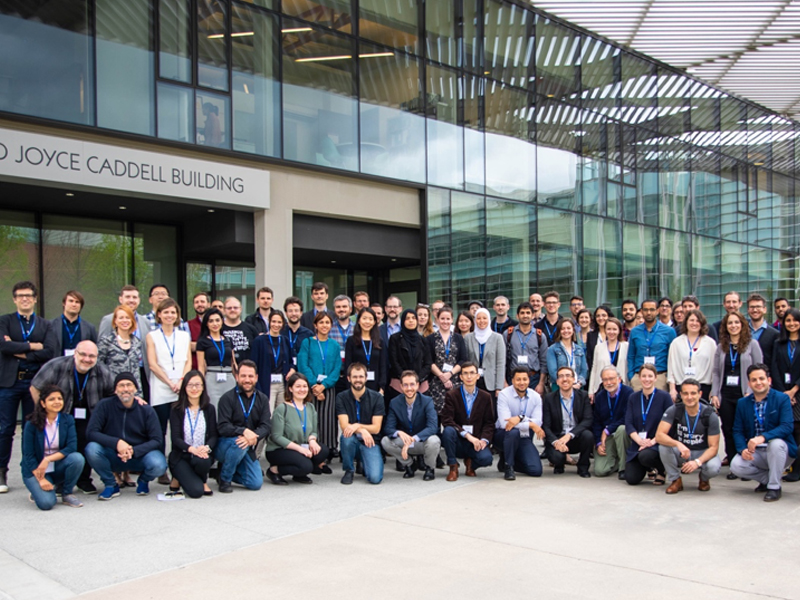Research Community Celebrates Simulation for Architecture

Research Community Celebrates Simulation for Architecture at Georgia Tech
March 20, 2019 | Atlanta, GA
Researchers and practitioners in the fields of architecture, urban design, urban planning, building science, and data science from across the globe convened in Georgia Tech April 7th–9th, 2019 for the 10th annual celebration of the Symposium on Simulation for Architecture & Urban Design (SimAUD). More than 100 experts from all over the world met to present and discuss cutting-edge research and findings, to experience hands-on simulation workshops and to speculate on future challenges and opportunities for the built environment.
The conference returned to the United States this year and took place at Georgia Tech as it celebrated its 10th anniversary. SimAUD was chaired by Siobhan Rockcastle, assistant professor in the School of Architecture and the Environment and Director of the Baker Lighting Lab at the University of Oregon, and Tarek Rakha, assistant professor of architecture and high performance building in the School of Architecture at Georgia Tech. The Scientific Chairs of the conference were composed of Carlos Cerezo Davila, Environmental Performance Director at Kohn Pederson Fox (KPF) New York, Dimitris Papanikolaou, assistant professor in the School of Architecture and the Department of Software and Information Systems in the College of Computing at University of North Carolina, Charlotte, and Tea Žakula, assistant professor in the Faculty of Mechanical Engineering and Naval Architecture at University of Zagreb, Croatia. More than 70 experts across the globe formed the Scientific Committee responsible for the double-blind peer review process for selection of publications for the conference proceedings.
“SimAUD brought together design technology representatives from across disciplines, including practice and academia, for deep and lively discussions on the challenges and opportunities in addressing technology research around the built environment” said Scott Marble, Chair of School of Architecture. “Our school continues to be a leader in the scholarly discourse of developing design technology through transdisciplinary collaboration, specifically focused on high performance building and environmentally sustainable design research.”
Watch: Recap of SimAUD 2019
Role of Simulation in the Built Environment
“Simulation and design computation have become ubiquitous across the design world,” said Rakha. “Design teams continue to assess and inform their decisions to achieve high performance buildings using simulation workflows that address complex issues that have already disrupted standard practices globally.”
Over the last decade, computing power has accelerated exponentially, in tandem with advances in hardware technology and software innovations that empower architects and urban designers through an expanded capacity to test their ideas and enhance them before their realization into built environments.
“With this expanded capacity comes a blurring of disciplinary boundaries as simulation-based decision support unites stakeholders from various fields,” said Siobhan Rockcastle. “In many ways, this increased collaboration between disciplines has made the building industry more amenable to reiteration, optimization, and integration across a range of performance considerations—from energy to form generation, fabrication, human comfort, and behavior.”
With that spirit, SimAUD 2019 offered a platform to unite researchers and practitioners in the fields of architecture, urban design, urban planning, building science, and data science. The conference invited submissions related to simulation with a special emphasis on methods that bridge disciplinary gaps between design, construction, operations, resource management, human behavior, and performance analytics across building and urban scales.
Georgia Tech Brings Built Environment Simulation Experts Together
The conference was previously held in Delft, the Netherlands (2018), Toronto, Canada (2017) and London, United Kingdom (2016), as well as six previous editions in the United States since 2010. Georgia Tech was selected to host this year because of the College of Design’s leadership in scholarship and education in design technology. The conference was organized by the Georgia Tech School of Architecture, and all sessions were chaired by Georgia Tech faculty. The event was held in the John and Joyce Caddell Building, which is home to the Building Construction program, and the venue was the Flex Space, a digital collaboration space with reconfigurable classrooms. The conference was supported by volunteering High Performance Building PhD students, School of Architecture staff and College of Design IT personnel.
This year's conference was exceptionally supported by sponsors, including platinum sponsorship by Autodesk and the United States Department of Energy (US DOE) through the National Renewable Energy Lab (NREL) and the International Building Performance Simulation Association in the US (IBPSA-USA). Gold sponsors included the practices of KPF and wemarathon.
In addition, KPF’s Urban Interface (KPFui) group developed an online application for computational urban design, which allowed participants to explore how urban form parameters affect the performance of a neighborhood in Atlanta. Experts in design, modeling and simulation competed to find the best performing solution.
The silver-level sponsors were the University of Oregon’s College of Design from the academy and software developer Environmental Design Solutions Limited (EDSL). Finally, the bronze sponsors included software companies Cove.tool and Integrated Environmental Solutions (IES). The conference a highly selective annual platform supported by the Society for Modeling & Simulation International (SCS) and the Association for Computing Machinery (ACM).
The next edition of SimAUD will be held in May 25th–27th, 2020 in Vienna University of Technology (TU Wien), Vienna, Austria.
Media Contact:
Carmen New
Marketing and Events Coordinator II
Georgia Institute of Technology | School of Architecture
carmen.new@design.gatech.edu